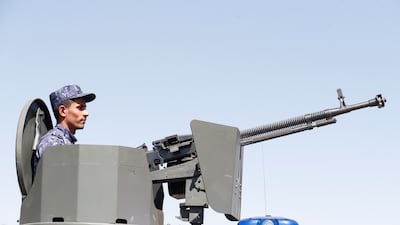Yemen’s war will not end through “quick fixes” but rather through an inclusive deal on which all sides must agree, experts and officials told The National, as a prisoner swap is set to begin.
An exchange of nearly 900 prisoners is taking place between the Iran-backed Houthis and the internationally recognised government.
The process is being enabled by the International Committee of the Red Cross (ICRC), which has been arranging the transfer and safety of the those involved. The process will last for three days and is expected to end on Sunday. The detainees will pass through six airports.
The UN-brokered deal is seen as a breakthrough in the long-running conflict, however, experts and officials have said that more needs to be done to ensure that peace prevails.
"It's clear that the nine-year-long Yemeni conflict cannot be resolved through quick fixes alone," Ahmed Nagi, senior Yemen analyst at the International Crisis Group, told The National.
"Instead, the country requires a comprehensive, multi-track strategy to address the extensive legacy of war and identify viable solutions for the future."
Mr Nagi said the swap would help build confidence between the two sides. During the past few years, local and international mediators have organised successful exchanges but "these actions have not resulted in any significant progress toward resolving the broader conflict", he said.
There is a seriousness about wanting to end the war and the prisoner swap operation could "increase swaps of prisoners or even serve as a catalyst for solutions to other conflict issues", he said.
Hooria Mashour, Yemen's former human rights minister and member of several civil society groups, told The National that any future talks and deals between the warring parties must include all components of the country to succeed.
"I am observing the developments in [the capital] Sanaa and across the country with cautious optimism as the Houthis have obstructed peace efforts in the past," she said.
"Today, they reject understandings with the legitimate government and have missed many opportunities for peace in the past."
For Yemen to have a successful peace process, all "parties and components of the country" must be considered, she said.
"Peace with only one party will be fragile and will not meet the aspirations of the overwhelming majority" Ms Mashour said. "Unfortunately, it will suffer a setback and we will see the return of violence and conflict."
Success of swap
Yemen’s warring sides both have prisoners they want to see released, which means the operation will be a success, Baraa Shiban, former adviser to the Yemeni embassy in London, told The National.
However, a lot more must be done to push for peace, he said.
“The prisoner swap in my opinion will go ahead even if no peace deal is announced because both parties have an interest in seeing it go through,” he said.

The Houthis seem keen to stop cross-border attacks in Saudi Arabia, said Mr Shiban, a former member of the Yemeni National Dialogue Council.
“However, I don’t see them ending their military attacks into other Yemeni provinces.
“They are happy to sign with Saudi Arabia but not the Yemeni government.”
By the end of the process, it is expected that 887 captives will be released as both sides agreed during talks in Switzerland last month.
The prominent detainees that will be released by the Iran-backed Houthis are Nasser Mansour Hadi, brother of Yemen's former president Abd Rabbu Mansour Hadi, former defence minister Mahmoud Al Subaihi and Mohammad Abdullah Saleh, brother of Yemen's Vice President Tareq Mohammad Abdullah Saleh.
"We are witnessing a demonstration of commitment from both sides to the agreed deal, as preparations for the exchange operation have been under way since the deal was signed," Mr Nagi said.
The ICRC has been working "diligently to ensure all logistical arrangements are in place and, at this point, it seems unlikely that any issues will arise that could potentially hinder the process", he said.
Last month's UN-led talks came amid increased international efforts to end the protracted conflict.
US and UN consultations with regional actors have been pushing for a fresh extension of a UN-brokered truce in Yemen as the deal still stands.
The truce has been holding since April last year and was renewed on August 2 for an additional two months through October 2.
The Houthis have since refused another extension.
In 2014, Sanaa was taken over by the Iran-backed Houthis. They ousted the internationally recognised government, prompting it to request Saudi Arabia's intervention to restore its power on its behalf.


